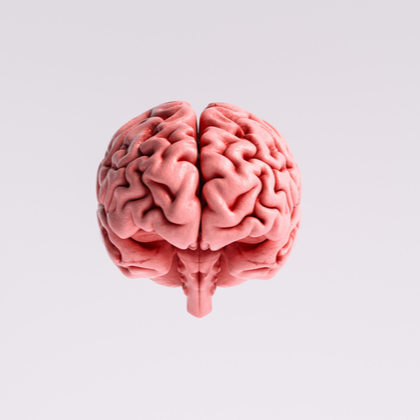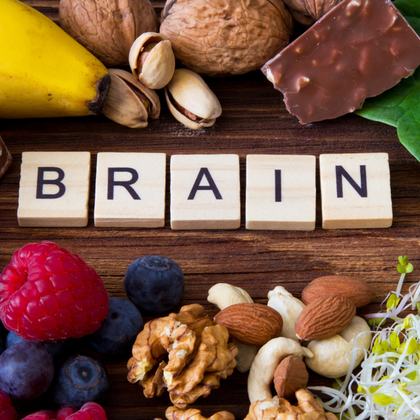
The human brain does many amazing things. It allows you to have thoughts and memories, to process information quickly and use language to communicate – all of which (and lots more) are collectively known as cognition. How your brain works can also lead to problems with mood, emotions and behaviour – in other words, your mental health. So how does cognitive health affect mental health (and vice versa)?
Cognitive disorders such as Parkinson’s disease, Alzheimer’s and epilepsy are considered to be neurological diseases rather than mental illnesses, while anxiety disorders and mood disorders aren’t thought of as cognitive problems but mental health disorders. One of the reasons they weren’t previously linked is because, in the past, relatively few scientists investigated the impact cognitive health might have on mental illness and wellbeing.
However, in recent years more and more experts have started to look at how the brain works in people with mental illnesses, and as a result the line between cognitive and mental health is becoming increasingly blurred. Researchers today are far more confident that there’s a real relationship between mental wellbeing and brain health (though, like the chicken and the egg, they can’t say definitively which comes first).

This increased interest in what happens in the brain in people with mental ill health has led many neuroscientists to believe mental illnesses are linked with problems with the brain’s structure, function and chemistry. In a nutshell, mental illness is now believed to have a biological basis.
Can brain scans help diagnose mental illnesses?
Unlike some other diseases, however, you can’t tell if someone has a mental illness by looking at a sample of their blood or urine, or by X-raying them. Instead, mental health conditions are diagnosed by the symptoms someone is experiencing. But research scientists now have various tests at their disposal to help them analyse what’s going on in the brains of people with mental ill health. Some use molecular or biochemical methods to analyse certain genes or proteins in brain cells, while others use imaging (brain scanning) techniques including:
-
Positron emission tomography (PET)
-
Magnetic resonance imaging (MRI)
-
Single photon emission computed tomography (SPECT)
-
Electroencephalography (EEG)
Each of these techniques has different advantages and provides different information about the function and structure of the brain, and can help scientists find out more about the changes that happen in the brains of people with mental illnesses. The ultimate goal, of course, is for their discoveries to lead to the development of better treatments and even potentially help find cures.
How does the brain function?
To understand more about what happens in the brain of someone with mental ill health, it’s a good idea to grasp the basics of how a normal brain works.
First of all, to say that the brain is a complex structure is an understatement. Every second within the brain, hundreds of thousands of chemical reactions occur, allowing us to think, act and respond to external stimuli (i). This happens because the brain is home to around 100 billion neurons (or brain cells) that communicate through electrical signals, all working together to make the body function. All this activity could explain why the brain accounts for just two per cent of body weight but uses 20 per cent of the body’s energy (ii).
The basic working unit of the brain is the neuron. Neurons, which have connections with other neurons, sensory receptors and muscle cells, are made up of four parts:
-
The cell body (each of these has a nucleus
-
Dendrites (fibres that branch out from the cell body and receive messages or signals from other neurons)
-
Axons (longer fibres that extend from the cell body and carry messages out to other cells)
-
Axon terminals (lots of fine branches found at the ends of axons)
Axon terminals are found near the dendrites of other neurons. Between them are spaces called synapses (or synaptic spaces). In fact, the average neuron is thought to form around 1,000 synapses with other neurons, with new synapses being formed and existing synapses strengthened all the time (this is the basis of learning) (i).
However, a synapse isn’t a physical connection between neurons but an intercellular space. So how do messages or signals travel from the end of one neuron (via the axon terminal) to another (via a dentrite) across the synapse?
This is where chemical compounds called neurotransmitters come into play. There are a variety of neurotransmitters used by the brain, but each individual neuron makes just one type. Some of the neurotransmitters in the brain you may have heard of include:
-
Serotonin
-
Glutamate
-
GABA
-
Dopamine
-
Norepinephrine
These neurotransmitters are released by sacs in the axon terminal called vesticles:
-
When an electrical signal from a neuron reaches that neuron’s axon terminal, the vesticles release neurotransmitters into the synaptic space.
-
The neurotransmitter molecules drift across the space and bind to receptors on the end of the receiving neuron, and generate another electrical signal that travels towards the neuron’s cell body.
-
Once the electrical signal has been generated, the neurotransmitter molecules are released back into the synaptic space. Some of them drift back to the axon terminal of the transmitting neuron, and into the vesticles where they can be used again another time.
All of this is relevant because it’s now thought that mental illnesses may result at least partly from problems with neurotransmission – that is, problems with communication between brain cells.
Mental health and brain health: how are they connected?
Thanks to advances in imaging technology, scientists can now literally see what happens in the brain when somebody has a mental illness. Here are a few examples of mental health conditions and what experts have found happens in the brain when someone is affected by them, plus the cognition problems that are linked with them:
Depression
In the UK, around five in every 100 adults have depression each year, with one in five women and one in 10 men experiencing depression serious enough to require treatment at some point during their lifetime (iii).
Like many other mental health conditions, depression is thought to be caused by a combination of biological, environmental and social factors – though nobody knows exactly what causes it. Some years ago PET and SPECT imaging showed that clinical depression may be linked with abnormal function in certain areas of the brain, particularly the frontal and temporal lobes (iv).
There’s also evidence there are fewer serotonin receptors in the brains of people with major depression (v). Indeed, the discovery that people with depression have low levels of serotonin led to the development of antidepressants called selective serotonin reuptake inhibitors (SSRIs) – these are now the most commonly used medicines for depression.
More recently scientists have found there are cognitive disorders associated with depression. These include problems with attention, executive functions*, memory and processing speed – problems that have been found to remain even when the other symptoms of depression have been treated successfully (vi).
(* Executive functions cover a wide range of cognitive processes such as flexible thinking, planning, self-control, regulation of motion and concentration.)
Obsessive compulsive disorder (OCD)
Someone affected by OCD experiences recurring obsessions, compulsions, or both. OCD is a common mental health problem, affecting around one to three in every 100 adults (vii). Some people with OCD may, for instance, wash their hands repeatedly, check their door is locked multiple times before leaving the house, or hoard things others might throw away – though these are just a few examples of the many ways OCD can affect you.
According to the International OCD Foundation, research suggests OCD involves problems with the front part of the brain and deeper structures of the brain, both of which use serotonin to communicate (viii). Meanwhile studies suggest people with OCD experience problems with executive functions as well as other cognitive abilities such as non-verbal memory and attention (ix).
Schizophrenia
Schizophrenia is a serious mental health problem with a range of symptoms including hallucinations (hearing, seeing, smelling or tasting things that aren’t real), delusions (having ideas that aren’t true), disordered thoughts and problems with behaviour, feelings and motivation (though despite what many people may think it has nothing to do with having a split personality (x)).
It’s also more common than you may think, affecting around one in 100 people (x). And while we still don’t know for sure what causes it, brain scans of people with schizophrenia have shown some parts of the brain are larger and others smaller compared with those who don’t have schizophrenia (xi). An imbalance of neurotransmitters in the brain may also be at play. For instance, it’s thought that dopamine levels are higher in people with schizophrenia – this idea is backed up by the fact that certain dopamine-releasing drugs can cause schizophrenia-like systems (xi).
Genes may also be important for the development of schizophrenia, since someone with a close family member who has schizophrenia has 10 times the normal risk of developing it themselves too (x).
Cognitive problems, meanwhile, are common in schizophrenia – in fact they are now considered a central feature of the illness and may be just as disabling as other types of symptoms. People with schizophrenia may, for instance, experience difficulties with attention, memory, learning, verbal skills and executive functions, with many scientists believing most people with schizophrenia have at least some cognitive impairment (xii).
Natural ways to keep your brain healthy
The evidence that suggests cognitive and mental health are linked is growing. But what can you do to reduce your risk of experiencing one or the other (or both)? One thing we know is that having a healthy lifestyle can help keep you healthy, including your brain. A healthy lifestyle includes:
-
Drinking alcohol in moderation (aim for no more than 14 units of alcohol each week on a regular basis)
-
Eating a healthy, balanced diet with at least five portions of fruit and vegetables every day
-
Keeping your weight healthy
-
Staying active (try to be moderately active for at least 150 minutes each week)
-
Reducing stress
Supplements for brain health
There are other things you could do to support your brain too, such as taking natural supplements. Here are some of the supplements you may want to consider trying – read more about them and the scientific evidence that supports their use for cognition support in our guide tonutrition for the brain
High-strength fish oils
Supplements made from oily fish that contain the omega-3 fatty acids EPA and DHA are thought to be good for your brain, so they may be particularly beneficial if you don’t like eating fish. If you’re a vegetarian or vegan you can now get these important omega-3s in a veggie/vegan-friendly formulation – look for omega-3 supplements that contain algae, which supply fish with omega-3s in the first place.
Turmeric (curcumin)
Curcumin is one of the many active ingredients found in the curry spice turmeric, and may be helpful for cognitive decline. You can add turmeric to your food, or take a turmeric supplement if that’s more convenient. Consider trying a good-quality supplement that provides a high percentage of curcuminoids (curcumin is a type of curcumninoid).
Ginkgo biloba
Nutritional therapists often use the herb ginkgo biloba to treat memory problems and cognitive function in older people.
B complex
Some of the B vitamins – including vitamin B6, B12 and folate (or folic acid) – may help slow down cognitive decline. B vitamins are widely available in our diet, but many people may not get enough of them. You can take individual B vitamin supplements, but it’s often considered more convenient to take a B complex supplement or a multivitamin formula with good levels of the Bs.
Astaxanthin
Antioxidants may be helpful in supporting cognitive health, especially if your levels are already less than decent. A particularly potent antioxidant found in a type of freshwater algae, astaxanthin can be found in supplement form as well as in foods such as salmon, lobster, crawfish, rainbow trout and crab. As a supplement it is usually suitable for vegetarians and vegans (check the label – some capsules can contain non-vegetarian and non-vegan ingredients).
Iodine
If you’re deficient in this essential mineral it can lead to an underactive thyroid, which can affect your cognition. You can get iodine in fish, eggs and other dairy products, as well as in nutritional supplements such as multivitamins.
Rosemary
Both the scent and compounds found in rosemary may be beneficial for memory problems. Add some of this fragrant herb to your food, or look for a nutritional supplement that contains it. You can also release the smell of rosemary essential oil in a heat-based diffuser.
Iron
This essential nutrient helps with blood flow, including blood flow to the brain, and is thought to help with cognitive health especially in those who are deficient in it. If you don’t eat a lot of iron-rich foods – such as red meat, liver, beans and nuts – you can get it in a single supplement or as part of a multivitamin formulation.
Zinc
This essential nutrient is found in high levels in the brain. You can get it in foods such as meat, nuts and dairy products, or if you don’t get much in your diet try a zinc supplement or multivitamin that has good zinc levels.
Phosphatidyl serine
Found in foods such as egg yolks, soya beans, fish and meat, phosphatidyl serine is often sold as a brain health supplement, as some experts think it may help boost memory and cognition.
Ashwagandha
One of the most widely used herbs in Indian Ayurvedic medicine, ashwagandha contains compounds called withanolides that some think are good for the brain. It’s widely available as a supplement, though not all brands contain beneficial levels of withanolides (look for a product that contains at least 1.5 per cent withanolides).
Vitamin C
Like the B vitamins, vitamin C is widely found in foods – yet some people may not be getting enough of it in their diets. Some scientists even believe it may help with cognitive functioning. You can get vitamin C supplements in many forms, including tablets, capsules and powder.
Magnesium
Found in foods such as dark chocolate, nuts, seeds, legumes, milk, oily fish, red meat and leafy green vegetables, magnesium may be beneficial if you want to give your brain a boost. However, despite the fact that it’s in many different foods, some people may have low levels of magnesium. If you want to try a supplement, look for magnesium in a more absorbable form, such as magnesium citrate.
Green tea
If you like drinking green tea, your brain may already be getting a supply of certain helpful compounds. If you’re not a fan of the taste, however, you can try a green tea supplement – choose a product with a good level of active antioxidant ingredients called polyphenols.
For information about a wide range of physical, mental and cognitive health and wellbeing issues, take a tour around our health library.
References:
-
Available online: https://www.ncbi.nlm.nih.gov/books/NBK20369/
-
Herculano-Houzel S. The remarkable, yet not extraordinary, human brain as a scaled-up primate brain and its associated cost. PNAS. 2012 Jun 26;109 (Supplement 1): 10661-10668. Available online: https://www.pnas.org/content/109/Supplement_1/10661
-
Available online: https://patient.info/mental-health/depression-leaflet#nav-2
-
George. MS, Ketter. TA, Post. RM. SPECT and PET imaging in mood disorders. J Clin Psychiatry. 1993 Nov;54 Suppl: 6-13.Available online: https://pubmed.ncbi.nlm.nih.gov/8270597/
-
Yatham LN. et al., Brain serotonin2 receptors in major depression: a positron emission tomography study. Arch Gen Psychiatry. 2000 Sep ;57(9):850-8. Available online: https://jamanetwork.com/journals/jamapsychiatry/fullarticle/205770
-
Perini G. et al., Cognitive impairment in depression: recent advances and novel treatments. Neuropsychiatr Dis Treat. 2019;15:1249-1258. Available online: https://www.ncbi.nlm.nih.gov/pmc/articles/PMC6520478/
-
Available online: https://patient.info/mental-health/obsessive-compulsive-disorder-leaflet
-
Available online: https://iocdf.org/about-ocd/what-causes-ocd/
-
Trivedi JK. Cognitive deficits in psychiatric disorders: Current status. Indian J Psychiatry. 2006 Jan-Mar;48(1): 10–20. Available online: https://www.ncbi.nlm.nih.gov/pubmed/18441173
-
Available online: https://patient.info/mental-health/schizophrenia-leaflet
-
Iritani S. What happens in the brain of xchizophrenia patients?: An investigation from the viewpoint of neuropathology. Nagoya J Med Sci. 2013 Feb ;75(1-2): 11–28. Available online: https://www.ncbi.nlm.nih.gov/pmc/articles/PMC4345712/
-
Bowie. CR., Harvey PD., Cognitive deficits and functional outcome in schizophrenia. Neuropsychiatr Dis Treat. 2006 Dec;2(4): 531–536. Available online: https://www.ncbi.nlm.nih.gov/pmc/articles/PMC2671937/
Related Posts
Disclaimer: The information presented by Nature's Best is for informational purposes only. It is based on scientific studies (human, animal, or in vitro), clinical experience, or traditional usage as cited in each article. The results reported may not necessarily occur in all individuals. Self-treatment is not recommended for life-threatening conditions that require medical treatment under a doctor's care. For many of the conditions discussed, treatment with prescription or over the counter medication is also available. Consult your doctor, practitioner, and/or pharmacist for any health problem and before using any supplements or before making any changes in prescribed medications.

Christine
Christine Morgan has been a freelance health and wellbeing journalist for almost 20 years, having written for numerous publications including the Daily Mirror, S Magazine, Top Sante, Healthy, Woman & Home, Zest, Allergy, Healthy Times and Pregnancy & Birth; she has also edited several titles such as Women’ Health, Shine’s Real Health & Beauty and All About Health.
View More



